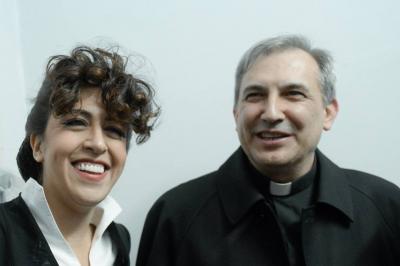Opposition to Pope Francis grows after 'VatiLeaks' trial

VATICAN CITY --“A revolution is afoot. One might even call it anarchy.” These are the words of a cardinal, in conversation with the 'Espresso', who claims to be a supporter of Pope Francis, but admits that opposition to his rule is growing fast despite his appointment being over three years ago. "The Vatileaks scandal has certainly done little to help his reputation,” he continues, “it was a total fiasco, a strategic and political disaster, even if the intentions behind it to stop an unacceptable leak of information were justified.”
A week has passed since 'informers' Francesca Chaouqui and the Spanish priest Angel Vallejo Balda, were convicted (their sentences, 10 and 18 months respectively), and whilst the trial may have been concluded with grace, the way is was conducted in preceding months have caused nothing but embarrassment for the Holy See.
The scandal arose, not just out of the corruption revealed by the bestselling books ‘Avarizia’ and ‘Via Crucis’ which showed how utopian the Pope's ideal of a ‘poor church’ is, but also out of the chaos it showed to be reigning within the inner workings of the Vatican. The job of its two new spokespeople (Father Federico Lombardi having been replaced immediately after the trial on account of his age) will certainly not be an easy one.
For the purported “anarchy” mentioned by the cardinal is working its way into the very structure of the Vatican. According to the German theologian Robert Spaemann, who claims the Argentinian pontiff “was at the heart of the chaos in the first place,” everything has happened for a reason -- not just because the pope is a pastor bent on implementing the teachings of Christ, but also because of his ardent wish for a “rugged Church," one that is “wounded and dirty,” but still open to all and distanced from the seclusion of power and security.
Up until now, Francis' rule has been substantially different from that of his predecessors Benedict XVI and John Paul II, in that he has given his deputies great administrative power, but only in their own sphere, according to the analysis by L'Espresso's veteran Vatican expert Sandro Magister.
Thus, there is little communication between heads of respective departments, who spend their time arguing over the management of the Treasury, and the pontiff will not tolerate anyone who tries to advise him on anything that is not in their sphere of responsibility.
“If someone tries to whisper advice to other cardinals during meetings, the pope will lose his patience and end the meeting there and then,” says of one of Francis's staff. “It then becomes incredibly difficult to come up with coherent ruling strategies, or to mediate between different factions and propose solutions that will suit everyone.”
Some think the chaos in the aftermath of the VatilLeaks trial was brought about by Angelo Becciu, the replacement for the Secretary of State to whom Pope Francis gave power over what is considered the Home Office in the Vatican. Certainly, he was among those to condemn the decision to prosecute Gianluigi Nuzzi and Emiliano Fittipaldi, the authors of 'Avarizia' and 'Via Crucis' who did much to disclose corruption within the Vatican.
It is easy to sympathise with Becciu’s stance, especially given the revelation that an estimated 422,000 euros originally destined for research into infantile diseases were instead spent on an extensive Bose hifi system and new marble flooring in the apartment of one cardinal, Tarcisio Bertone.
jp-le


